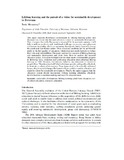Lifelong learning and the pursuit of a vision for sustainable development in Botswana

View/
Date
2011-07Author
Maruatona, T.
Publisher
SCE, http://www.tandfonline.com/loi/csce20Type
Published ArticleMetadata
Show full item recordAbstract
This paper analyses Botswana's commitment to lifelong learning policy and discusses how it can help the state achieve its vision for sustainable development. First, it argues that while Botswana is renowned for its economic success, it still fails to address positively such traditional challenges as poverty, unemployment and income inequality, which are increasing disproportionately, especially among the youth and non-literate adults. These structural problems can be attributable partly to the low quality of education, which does not enable learners to reduce their risks and vulnerabilities. The paper outlines the concepts of lifelong learning and sustainable development and work from there to analyse the national education policy. It is acknowledged that the state made commendable progress in delivering basic, extension and continuing education since adopting lifelong learning in 1994. However, the delivery failed to use education to transform people's lives. The education itself failed to balance quantity with quality effectively to inculcate a culture of democracy. These issues need to be critically addressed because they invariably hamper Botswana's efforts to deliver quality education and attain its vision for sustainable development. Finally, the paper suggests that the education system should incorporate lifelong learning principles, effectively involve learners in decision making and teach for empowerment.
